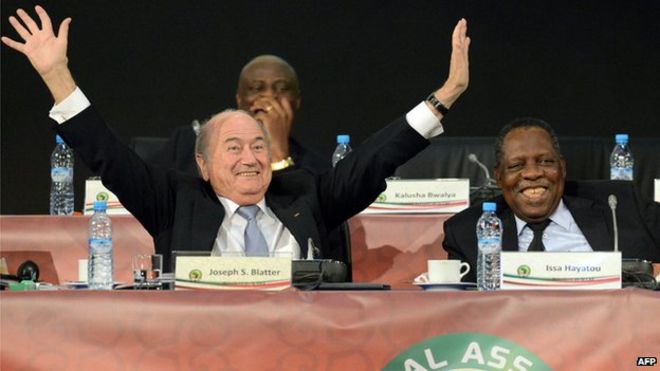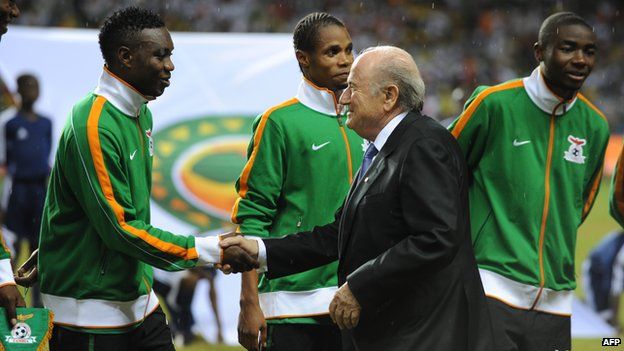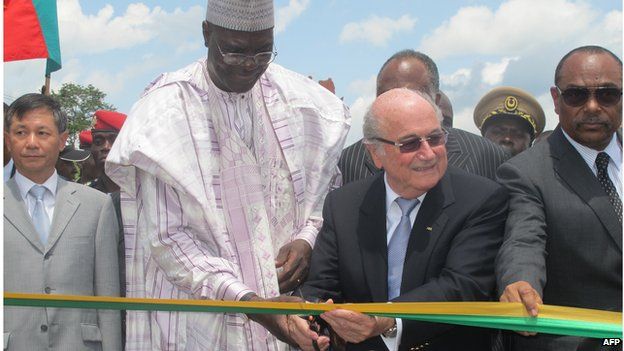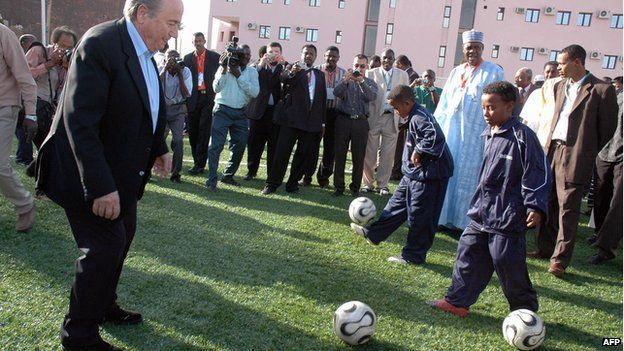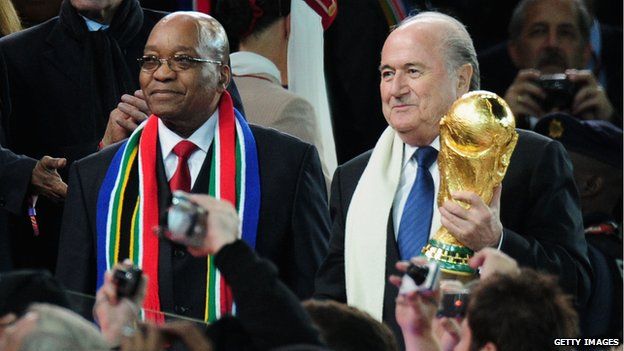Fifa vote: Why Africa backs Sepp Blatter
By Matthew KenyonBBC Africa Sport
- 6 minutes ago
- From the sectionAfrica
Sepp Blatter has previously been able to count on African delegates' votes
The woman who took on Fifa
If you read most of the world's media, Sepp Blatter's ability to hang on to power at Fifa is nothing short of miraculous.
After years of negative headlines, the frenzy has reached fever pitch in the wake of the US allegations of corruption at the highest level in football - even though Mr Blatter himself has not been implicated.
And running through all this coverage is a theme - bemusement that much of the football world keeps voting for him.
Nowhere is Sepp Blatter's support stronger than across Asia and Africa. So why, as they troop into the Fifa congress hall in Zurich, are most of the representatives from those two continents preparing to vote for him again?
Here's about as succinct an answer as you're going to get - from Amaju Pinnick, newly elected president of the Nigerian Football Federation, talking to the BBC on Thursday: "Blatter feels Africa, he sees Africa and he has imparted so much - a lot of developmental programmes.
"Without Blatter we wouldn't enjoy all the benefits we enjoy today from Fifa. What Blatter pushes is equity, fairness and equality among the nations. We don't want to experiment."
Sepp Blatter (here with the Zambian team) "feels Africa", said one delegate
Development? Benefits? Equity? We're talking about two things really - the first is concrete investment, often literally so. The second is respect.
If you go to Fifa's website, search for the "
development globe". You'll get a jazzy tool which lets you spin the world around, with clickable symbols corresponding to every little project Fifa has carried out in recent years - all of them under Sepp Blatter.
I clicked at random on Chad - not one of Africa's footballing powerhouses.
Since 2011, according to Fifa, Chad has benefited from 26 projects undertaken by the world governing body. We're talking about artificial pitches, a technical centre, a new HQ for the federation - but also education seminars on marketing, refereeing, grassroots football and so on. The list is long.
That pattern is repeated across Africa and around the world.
Sepp Blatter - here with Cameroon's sports minister - has overseen massive investment in facilities in Africa
And it has been Mr Blatter who has pushed the programme. He, both as Secretary General and then as Fifa president, helped encourage the boom in football - and raked in billions of dollars from media and marketing as a result.
And it has been Mr Blatter who has made sure significant amounts of that cash has been spent in pretty much every football nation that can spend it. That earns him a huge amount of support.
This facility in the Sudanese capital Khartoum was inaugurated in 2007
Respect is harder to quantify, but is just as valuable when it comes to earning votes. Sepp Blatter has been in charge as the game has become truly global.
Fifa's historical Eurocentrism (stronger words than that have been used) has been swept away - and Mr Blatter has been the driving force.
Blatter's worldwide support network
A look at world media coverage shows it is not just Africa where support for Mr Blatter remains rock solid.
India's Hindustan Times said Mr Blatter still had the country's support because "Blatter's art of giving is likely to matter more than the allegations of corruption". El Salvador's delegate said that as Mr Blatter remains committed to projects in the central American nation "then we have committed to vote for him".
Russia - due to host the World Cup in 2018 - remains a staunch supporter of Mr Blatter too. Moskovskiy Komsomolets is one of several papers which describe the US charges against Fifa officials as politically motivated.
But few manage language as strongly supportive as Guinea-Bissau FA president Manuel Nascimento Lopes, who said voting for anyone but Mr Blatter would be "blasphemy".
Who still supports Sepp Blatter?
The World Cup has gone to Asia (Japan/Korea 2002) and Africa (South Africa 2010) for the first time.
The number of countries that can qualify for the finals has expanded at the same time - giving nations like Angola and Togo the chance to sup at the top table.
Sepp Blatter (at right, with South African President Jacob Zuma) brought the World Cup to Africa for the first time
Countries which had felt excluded now feel the opposite - and that too earns loyalty.
None of which is to say it is a simple picture. The AFC (Asian Football Confederation) and CAF (Confederation of Africa Football) are backing Blatter collectively, but it is individual associations which have the votes. And not all of them will fall in line.
And there is a feeling amongst many that, whatever the benefits he has brought, Sepp Blatter's time may have come.
Here's a voice from Zambia, former administrator Simataa Simataa:
"A lot of things have been done using Fifa money - the perception is that its Sepp Blatter's money. But this should be done anyway, whether Mr Blatter is there or not.
"It is about more than just projects, it is about constitutions, about rules, about ethics - and all those I've mentioned have declined under the leadership of Sepp Blatter."
That may be a view which has gathered traction in the past two days, as the crisis sparked by the arrests of senior officials has engulfed the game.
But, for time being, the majority of voters within Fifa - and remember how small the electorate is - are likely to echo Mr Pinnick. "We don't want to experiment."
This facility in the Sudanese capital Khartoum was inaugurated in 2007







 Jack Warner the G
Jack Warner the G

